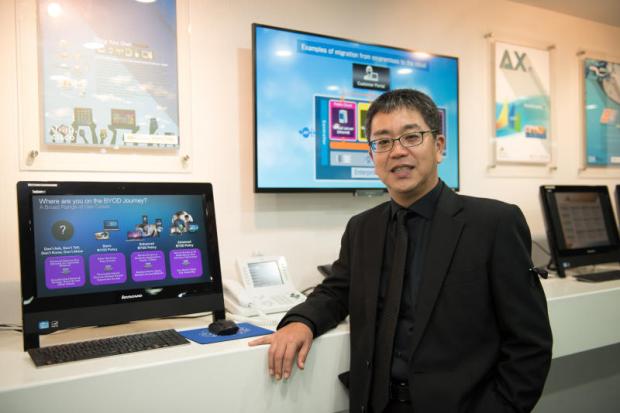
NTT Communications Thailand, the local unit of the Japanese telecommunications firm, is bringing artificial intelligence (AI) and Internet of Things (IoT) to Thailand to hasten business transformation.
The move aims to increase value-added services and set the company apart amid intense competition for data centres and cloud services.
"Outside Japan, Thailand is the first country where we applied AI as part of our services to customers," said Masatoshi Tsuboi, vice-president of NTT Communications Thailand.
The company will test AI technology working as a reception with auto response to visitors' inquiries in its fiscal 2018 starting in April. The AI system supports Japanese, English and Thai languages.
"We will provide AI system to the service sector, for contact centres and reception," Mr Tsuboi said. "By utilising the technology of machine learning, the response function is highly accurate as visitor recognition can be done by AI engine."
IoT and wearable solutions are also emerging areas, he said, adding that the company will provide a "smart shirt" called "hitoe" with a functional material that acts as a sensor that captures biosignals of heart and muscle.
The smart shirt, a co-development of Toray Industries and NTT Corporation, will detect information, process it in the cloud and display information via smart devices.
"In Japan, we use smart shirts on public vehicle drivers and airline staff to detect their health and increase safety," Mr Tsuboi said.
In addition, the company will provide technology that improves the connected networking software, defined WAN (wide area network), by reducing bottleneck traffic and increasing network performance by 30%.
Mr Tsuboi said the major business opportunity is still in data centres, such as disaster recovery and backup, and cloud services.
"We will target enterprise, financial and insurance institutions, mobile banks and startups, as well as multinational firms," he said.
Manabu Kahara, president of NTT Communications Thailand, said that in 2018, "ICT spending in Thailand should be growing, albeit at a single-digit pace, thanks to Thailand 4.0 and new megaprojects in the Eastern Economic Corridor".
He said the country needs to drive towards digital, changing from labour-intensive to knowledge-intensive industry, and increase its productivity by automation technology and outsourcing services.
With the economic and stock exchange improvement driving corporate spending for digital transformation, NTT Communications Thailand aims for revenue to grow at double-digit rates to reach 2 billion baht in fiscal 2017, which ends in March 2018.
Mr Kahara said the company intends to have equal revenue between Japan- and non-Japan-based customers by 2020. For fiscal 2017, NTT expects 70% of revenue from Japan-based customers and 30% from non-Japan.
Teerawut Sunamalai, vice-president and chief financial of NTT Thailand, said the company spent 200 million baht for the second phase of the Bangkok 2 Data Centre at Amata in September, and the Thailand office will be a hub connecting the Greater Mekong Subregion spanning Myamar, Cambodia and Laos.
Mr Teerawut said Thailand could be a digital hub because of its central advantage in the region and the tax privileges offered by the Board of Investment for data centre cloud business.
But the price of internet connection in Thailand, 12 times higher than Singapore in 2016, needs to be cut to attract global content providers, he said.
Singapore also waives the goods and service tax for data centre services.